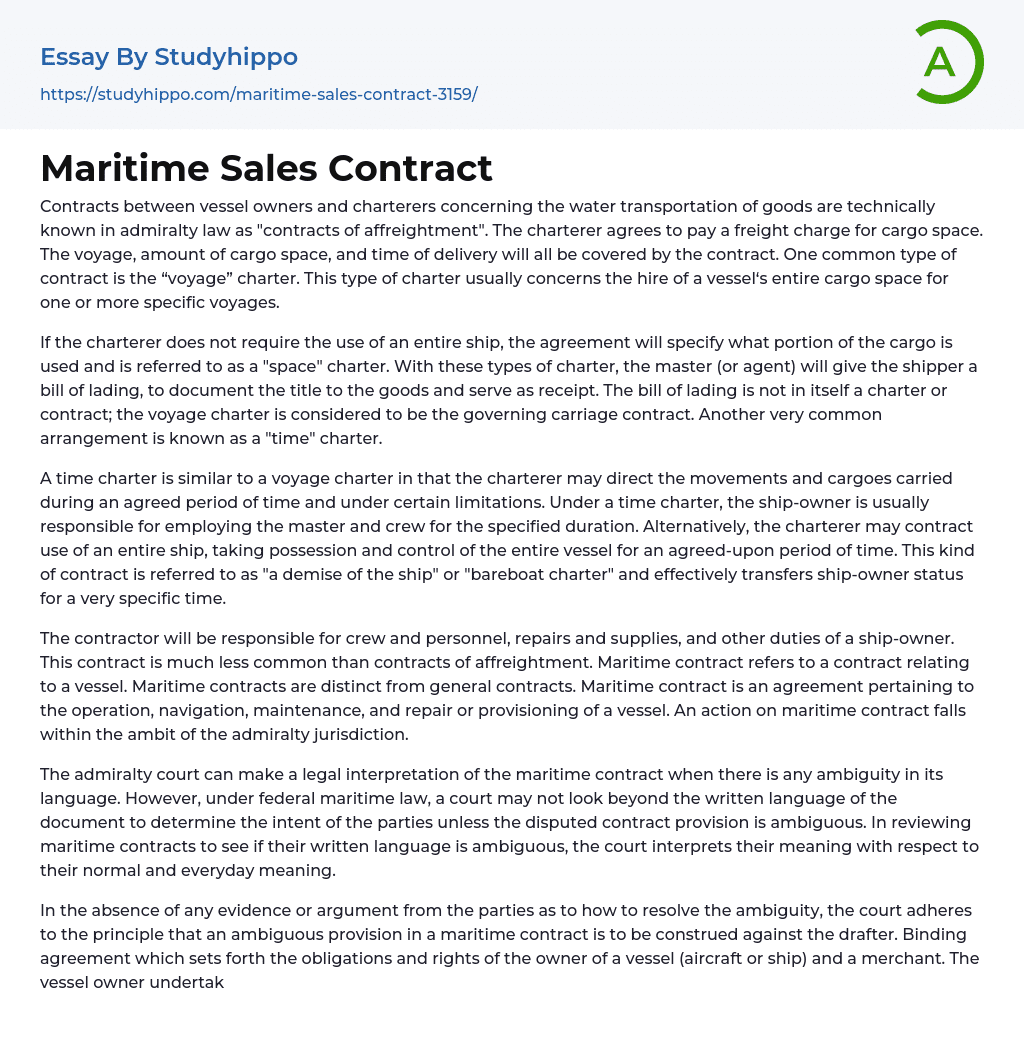Contracts between vessel owners and charterers concerning the water transportation of goods are technically known in admiralty law as "contracts of affreightment". The charterer agrees to pay a freight charge for cargo space. The voyage, amount of cargo space, and time of delivery will all be covered by the contract. One common type of contract is the “voyage” charter. This type of charter usually concerns the hire of a vessel‘s entire cargo space for one or more specific voyages.
If the charterer does not require the use of an entire ship, the agreement will specify what portion of the cargo is used and is referred to as a "space" charter. With these types of charter, the master (or agent) will give the shipper a bill of lading, to document the title to the goods and serve as receipt. The bill of lading is
...not in itself a charter or contract; the voyage charter is considered to be the governing carriage contract. Another very common arrangement is known as a "time" charter.
A time charter is similar to a voyage charter in that the charterer may direct the movements and cargoes carried during an agreed period of time and under certain limitations. Under a time charter, the ship-owner is usually responsible for employing the master and crew for the specified duration. Alternatively, the charterer may contract use of an entire ship, taking possession and control of the entire vessel for an agreed-upon period of time. This kind of contract is referred to as "a demise of the ship" or "bareboat charter" and effectively transfers ship-owner status for a very specific time.
The contractor will be responsible for crew and
personnel, repairs and supplies, and other duties of a ship-owner. This contract is much less common than contracts of affreightment. Maritime contract refers to a contract relating to a vessel. Maritime contracts are distinct from general contracts. Maritime contract is an agreement pertaining to the operation, navigation, maintenance, and repair or provisioning of a vessel. An action on maritime contract falls within the ambit of the admiralty jurisdiction.
The admiralty court can make a legal interpretation of the maritime contract when there is any ambiguity in its language. However, under federal maritime law, a court may not look beyond the written language of the document to determine the intent of the parties unless the disputed contract provision is ambiguous. In reviewing maritime contracts to see if their written language is ambiguous, the court interprets their meaning with respect to their normal and everyday meaning.
In the absence of any evidence or argument from the parties as to how to resolve the ambiguity, the court adheres to the principle that an ambiguous provision in a maritime contract is to be construed against the drafter. Binding agreement which sets forth the obligations and rights of the owner of a vessel (aircraft or ship) and a merchant. The vessel owner undertakes to provide cargo-space (at a specified time, and for a specified freight) to the merchant who is liable for payment whether or not the cargo is ready for shipment.
This contract addresses issues associated specifically with a vessel, its crew, and the routes on which it will be plied. Also called contract of freightment. Maritime causes are those arising from maritime contracts, whether made at sea or on land, that
is, such as relate to the commerce, business or navigation of the sea; as, charter parties, affreightments, marine loans, hypothecations, contracts for maritime service in building, repairing, supplying and navigating ships, contracts and quasi contracts respecting averages, contributions and jettisons; contracts relating to marine insurance, and those between owners of ships.
There are maritime causes also for torts and injuries committed at sea. In general, the courts of admiralty have a concurrent jurisdiction with courts of law, of all maritime causes and in some cases they have exclusive jurisdiction.
MARITIME CONTRACT - One which relates to the navigation of the sea. The admiralty has jurisdiction in case of the breach of such contract, whether it has been entered into on land or at sea
- Jurisprudence essays
- Social Injustice essays
- Juvenile Justice essays
- Agreement essays
- Business Law essays
- Common Law essays
- Community Policing essays
- Constitution essays
- Consumer Protection essays
- Contract essays
- Contract Law essays
- Copyright Infringement essays
- Court essays
- Crime essays
- Criminal Law essays
- Employment Law essays
- Family Law essays
- Injustice essays
- Judge essays
- Jury essays
- Justice essays
- Lawsuit essays
- Lawyer essays
- Marijuana Legalization essays
- Ownership essays
- Police essays
- Property essays
- Protection essays
- Security essays
- Tort Law essays
- Treaty essays
- United States Constitution essays
- War on Drugs essays




